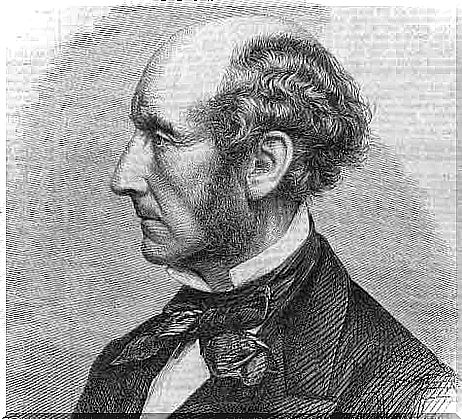Utilitarianism, The Philosophy Of Happiness

¿ What would express John Stuart Mill, the father of utilitarianism, when he said ” ask yourself if you are happy and cease to be “? Is it better not to question anything in life? Perhaps the best thing is that we see what this philosophy of life consists of, to see if we can find answers along the way. Seem to you?
Next, we will enter a unique world through a philosophical doctrine a thousand times misinterpreted. That is why I think it is interesting to shed some light on the subject, since as a theory put into practice it could be very useful, but it is easy to get lost and get separated from its true postulates.
Utilitarianism and John Stuart Mill
John Stuart Mill was an English politician, philosopher and economist who postulated and promoted the moral theories of utilitarianism. To do this, he relied on the ethical principles promulgated by his godfather, Jeremy Bentham.

We can define utilitarianism as the philosophical doctrine that bases utility as the principle of morality. Mill developed a theological ethical system whose foundation was determined by the moral conception based on the final result.
Therefore, one of the fundamental principles of this doctrine is social welfare. And this can only be reached, according to these postulates, by promoting the set of freedoms. In other words, a freer population will be happier and, therefore, will have greater well-being.
Both Mill and Bentham believed that anything that gives pleasure to as many people as possible is a good thing. And for this, the social status of individuals should not be taken into account.
As Sánchez Migallón, from the University of Navarra, points out , utilitarianism is a very simple theory. So much so that “it gives it an undoubted advantage to defend itself against the complexity of other moral systems . ” According to Sánchez Migallón, this simplicity can be seen in three fields:
- Theoretical statement. Utilitarianism upholds a single principle and in this way obtains clarity and simplicity.
- Psychological description. The only thing relevant to morality is the intention to produce happiness.
- App. It is the same doctrine for both individual and public morality.
Utilitarianism is not hedonism

This philosophy of life has led to many confusion throughout history. There is an interpretation that associates it with hedonism, for example.
However, Mill established that the greatest good for the greatest number of people is the correct formula for calculating overall happiness. And although some pleasures are of “superior quality”, they have nothing to do on a generic level with hedonism.
In this sense, the English philosopher believed that the best way to achieve maximum happiness was through instruction. That is, a more educated and educated society would be able to achieve a greater good.
According to this philosophy, an educated person has more tools – more and better instruments – to carry out beneficial moral actions. To know if they are correct, you simply have to differentiate between their positive and negative consequences. As long as the good side outweighs the bad, the action is correct and moral.
Important Considerations About Utilitarianism
It is worth highlighting a number of important considerations regarding Mill’s utilitarian theories. For example:
Everything
A utilitarian views a whole as greater than the sum of its parts. For example, a society is much more than the sum of social relations. Therefore, an individual good will never be at the level of the good that can be obtained from a social good, whose benefits will derive from all members of society.

The change
Although utilitarianism is based on certain laws, none are eternal and immutable. The world is in constant flux. Hence, collaboration is essential.
This promotes both individual and collective utility. In addition, it is thus achieved that individual rights contribute to a greater and higher social utility.
The interpretations
It should be noted that many other movements, such as neoliberalism, have confused or misinterpreted utilitarian ideas. The individual pleasure that Mill promulgates has nothing to do with the particular selfishness proposed by neoliberal thinkers.
Despite the possible good results that benefit a society derived from a selfish position, this is not the idea that the English philosopher defends in his doctrine, since they have nothing to do with selfishness, but quite the opposite. Individual moral action leads to a greater common good.
The truth is that utilitarianism may seem simple at first glance. The action with more positive than negative benefit is moral, and therefore correct. However, it is clear that we are not putting it into practice.
Maybe we think a lot, as Mill believed? Without a doubt, it would be nice to live in a more ethical world, where each individual benefit results in a greater social good, don’t you think?









